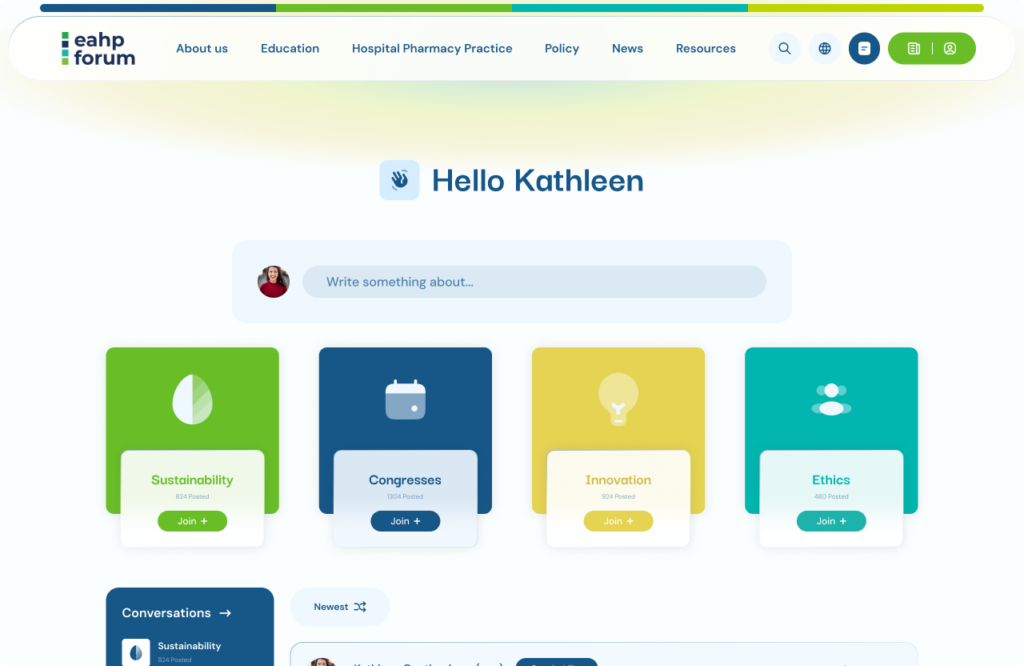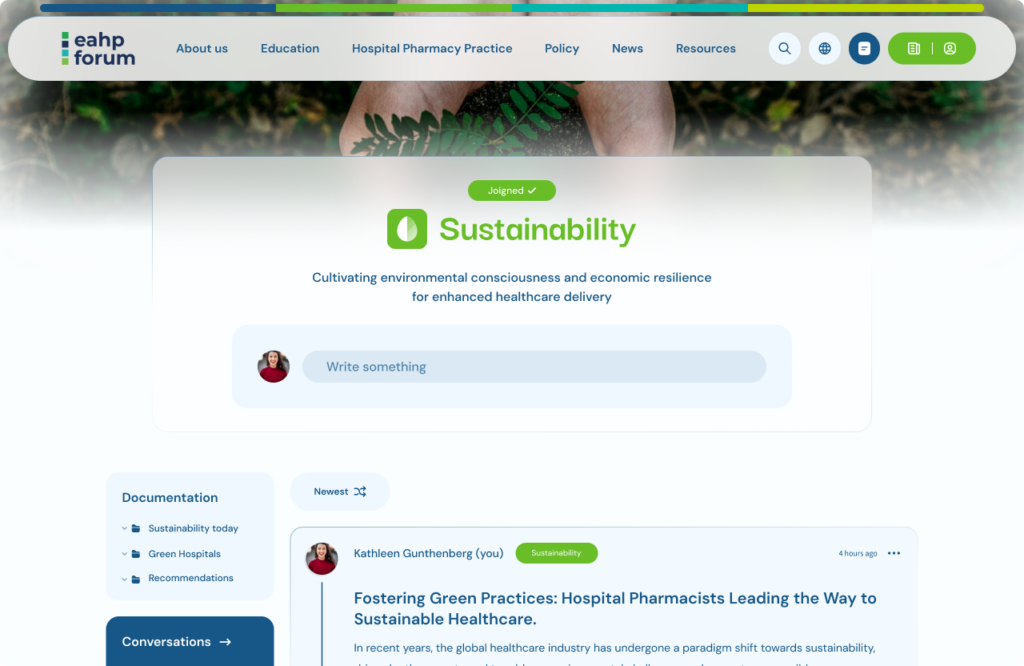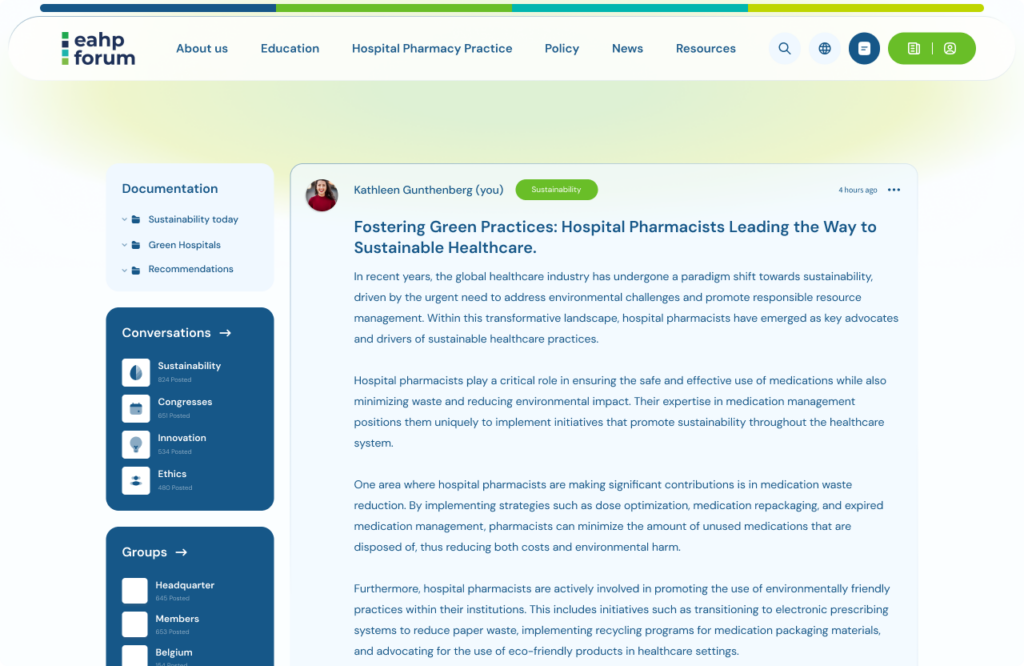The EAHP EU Monitor is a regular round up of news relevant to hospital pharmacy in Europe.
Registration and abstract submission for EAHP’s 25th Congress open on Saturday!
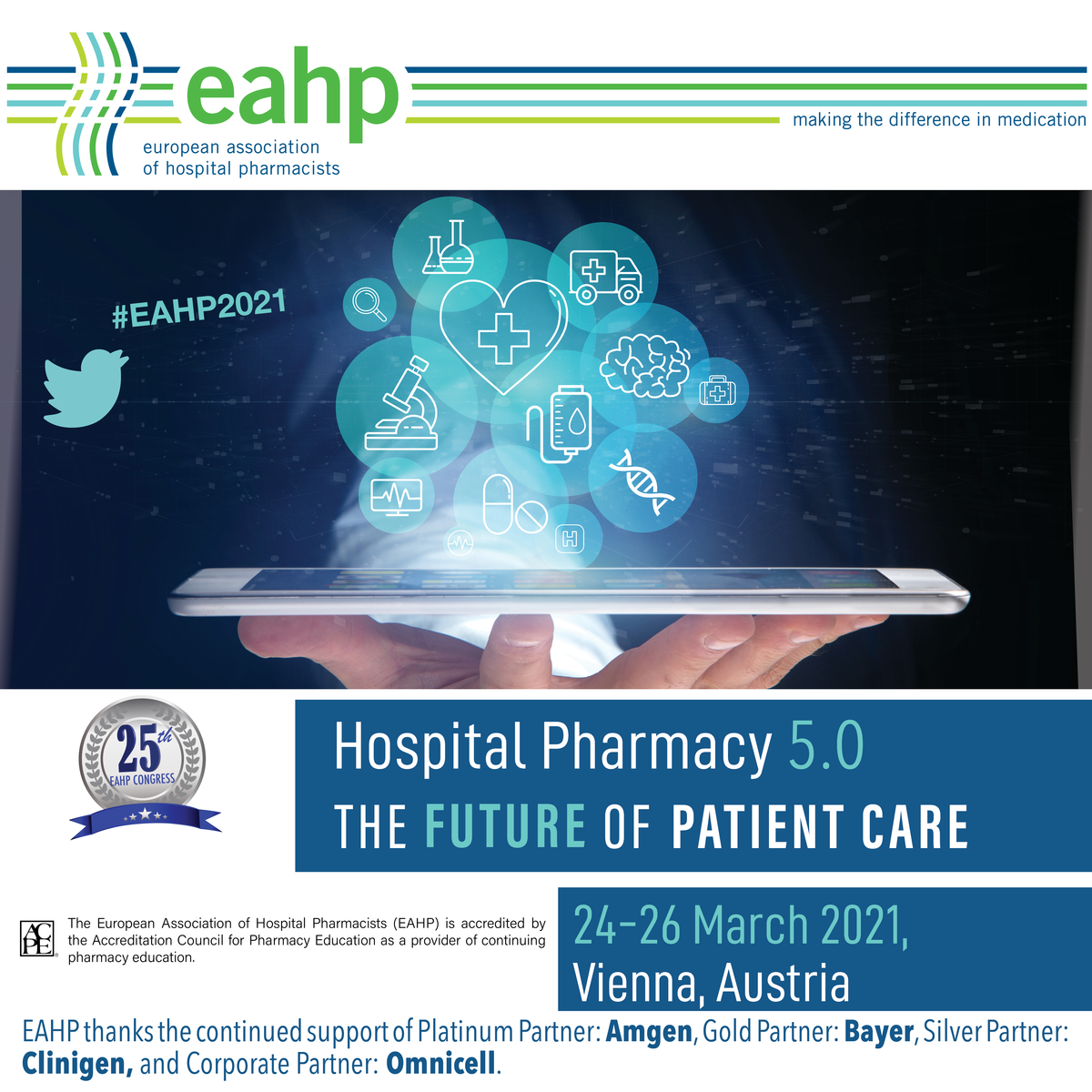
In case you are considering to submit an abstract to the upcoming Congress of the European Association of Hospital Pharmacists (EAHP) make sure that you start your preparation. Abstract submission will be open between 1st August and 15th October 2020 for hospital pharmacists, other healthcare professionals and interested scientists.
The 25th Anniversary Congress of EAHP will be held in Vienna, Austria from 24th and 26th of March 2021. Different seminars, workshops and keynotes will be organised around the theme: “Hospital Pharmacy 5.0 – the future of patient care”. Abstract authors are kindly reminded to carefully read and comply with the guidelines presented on EAHP’s website which outline the review process, provide guidance to those submitting abstracts for the first time and list tips on avoiding abstract rejection. Submissions of abstracts from all disciplines of hospital pharmacy or related areas are encouraged, provided that they can be linked to one of the 44 European Statements of Hospital Pharmacy.
Abstracts must be written in accordance with a pre-defined structure (background, purpose, materials and methods, results, conclusions) and they should not exceed the limit of 350 words. The online submission system will guide abstract authors through the process. Questions concerning the abstract submission process can be addressed to abstract@eahp.eu. The best abstracts/posters, with regards to aspects like originality, scientific quality and practical applicability, will be awarded with 3 prizes amounting to 750 euro, 500 euro and 250 euro.
In addition to the abstract submission also the Congress registration will open on 1st August 2020.
Follow us on Twitter, Facebook, Instagram, and LinkedIn to stay up-to-date with the latest news from #EAHP2021!
Register for EAHP’s 25th Congress HERE
Learn more about the abstract submission process HERE
EAHP and ESOP formalise collaboration through signature of MoU

Earlier this month, EAHP and the European Society of Oncology Pharmacy (ESOP) concluded a Memorandum of Understanding (MoU) to formalise the collaboration of hospital and oncology pharmacists. Both organisations are looking forward to work in the future on common issues.
Key focus will be put on awareness-raising linked to medicines shortages and hazardous medicinal products, the promotion of educational activities undertaken by EAHP and ESOP and the advancement and recognition of the hospital and oncology pharmacy specialisations in Europe. EAHP will keep its members updated about the collaboration via its social media channels (Twitter, Facebook, Instagram, and LinkedIn) and its website.
EP initiatives to support the fight against cancer
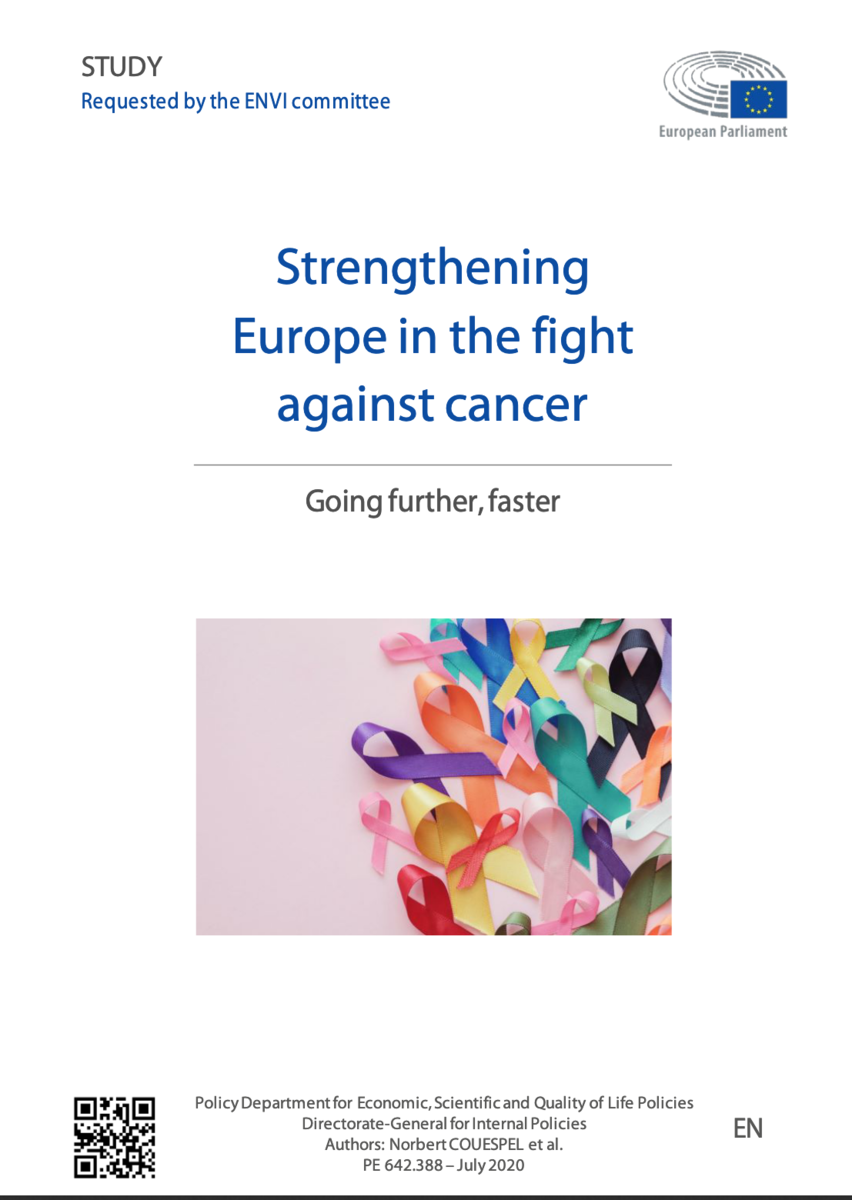
The European Parliament has released a study that sheds light on the current state-of-play in Europe in respect to cancer. The document titled “Strengthening Europe in the fight against cancer – Going further, faster” was compiled by experts of the European Cancer Organisation. Also, a dedicated cancer committee was set up by the European Parliament.
The study focuses on four main areas: causation of cancer; cancer screening and early diagnosis; access to cancer treatment, care and research; and rare and childhood cancers. It contains key findings and 45 recommendations which are intended to provide Members of the European Parliament with a strong evidence-based foundation for their scrutiny and suggestions for the Europe’s Beating Cancer Plan, the EU Cancer Mission and associated initiatives such as the new EU Pharmaceutical Strategy and EU4Health Programme.
In June also the creation of a Special Committee on Beating Cancer (BECA) was agreed on by the Members of the European Parliament. BECA will be tasked with evaluating different EU actions, identifying legislation and other measures that could be implemented to support the prevention and control of cancer in the EU.
Read the study HERE
Updates from the European Medicines Agency
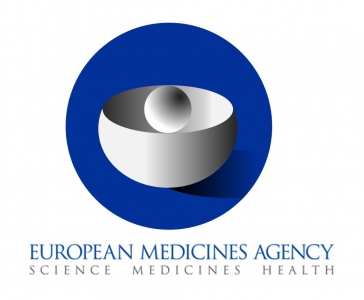
The European Medicines Agency (EMA) published new communications linked to the review of dexamethasone, Panexcell Clinical Laboratories and the authorised uses of the cancer medicine Yondelis.
EMA starts review of dexamethasone for treating adults with COVID-19 requiring respiratory support
EMA is reviewing results from the RECOVERY study arm that involved the use of dexamethasone in the treatment of patients with COVID-19 admitted to hospital. This part of the study looked into the effects of adding dexamethasone to usual care in adults receiving invasive ventilation, those given oxygen (e.g. through a mask) or those receiving no oxygen. Invasive ventilation involves use of a machine to push air through a tube inserted into the patient’s airway.
The RECOVERY study recorded deaths during 28 days after starting dexamethasone treatment. Preliminary results indicate that, compared with usual care, dexamethasone:
- reduced mortality by about 35% in patients on invasive mechanical ventilation;
- reduced mortality by about 20% in patients receiving oxygen without invasive ventilation;
- did not reduce death in patients who were not receiving oxygen therapy.
The review aims to provide an opinion on the results of the RECOVERY study and in particular the potential use of dexamethasone for the treatment of adults with COVID-19.
EMA will communicate further when the review is complete.
More information is available HERE
Please check EMA’s dedicated webpage on COVID-19 for the latest updates.
Panexcell Clinical Laboratories: suspension of medicines over flawed studies
EMA’s human medicines committee (CHMP) has recommended the suspension of the marketing authorisations of generic medicines tested by Panexcell Clinical Laboratories Priv. Ltd at its site in Mumbai, India. The recommendation comes after Austrian and German inspectors found irregularities in how the company carried out bioequivalence studies. These are studies used to show that a generic medicine produces the same amount of active substance in the body as the reference medicine.
The inspectors found samples from different patients that were exceptionally similar and an instance of personnel documenting the wrong room temperature for the area where samples were being processed. These findings raise serious concerns about the company’s quality management system and the reliability of data from that site.
The CHMP looked at all medicines tested by Panexcell on behalf of EU companies and found none for which adequate data were available from other sources. The Committee therefore recommended that all medicines authorised in the EU on the basis of bioequivalence studies conducted by Panexcell be suspended from the market. To lift the suspension, companies in the EU relying on data from Panexcell must provide alternative data demonstrating bioequivalence. Medicines currently being evaluated for authorisation on the basis of data from Panexcell will not be granted authorisation in the EU.
EMA and national authorities will continue working closely together to ensure that studies on EU medicines are carried out to the highest standards and that companies comply with all aspects of Good Clinical Practice (GCP). If companies do not meet required standards, authorities will take whatever measures necessary to ensure the integrity of data used to approve EU medicines. The CHMP’s recommendation is being sent to the European Commission for a legally binding decision.
More information is available HERE
Authorised uses of cancer medicine Yondelis unchanged following review of new data
EMA has recommended that the use of Yondelis (trabectedin) in treating ovarian cancer remain unchanged following a review of a study that investigated Yondelis as a third-line treatment in patients with ovarian cancer. However, the study results will be included in the medicine’s product information to provide healthcare professionals with the most up-to-date information on the effects of Yondelis in patients with ovarian cancer.
An analysis of study OVC-3006 investigating the use of Yondelis plus pegylated liposomal doxorubicin (PLD, another cancer medicine) in patients with ovarian cancer was carried out while the study was still ongoing and showed that, overall, patients treated with Yondelis plus PLD did not live longer than patients given PLD alone. As a result, the study was terminated ahead of time.
EMA’s human medicines committee (CHMP) has now assessed the data and concluded that the results available are not robust enough to draw firm conclusions. Available evidence from the study does not put into question the benefits and risks of Yondelis in its currently authorised uses. Further, there are key differences between OVC-3006 and the study that supported the authorisation of Yondelis (OVA-301). The main difference is that patients in study OVC-3006 had a more advanced disease and had been more heavily treated than those included in OVA-301. In addition, a significant proportion of patients in study OVC-3006 had ovarian cancer that was resistant to medicines containing platinum, while Yondelis is currently authorised for platinum-sensitive ovarian cancer.
When considering Yondelis’ safety, the CHMP noted that in the OVC-3006 study patients treated with Yondelis and PLD had more side effects and more severe ones than those treated with PLD only; however, the committee considered that a higher occurrence of side effects is not unexpected with combination treatments compared to treatments used alone.The CHMP recommended that the results of the study be included in the summary of product characteristics of Yondelis so that healthcare professionals have the most up-to-date information when prescribing the medicine.
More information is available HERE
EJHP: Informing critical care drug requirements in response to the COVID-19 pandemic
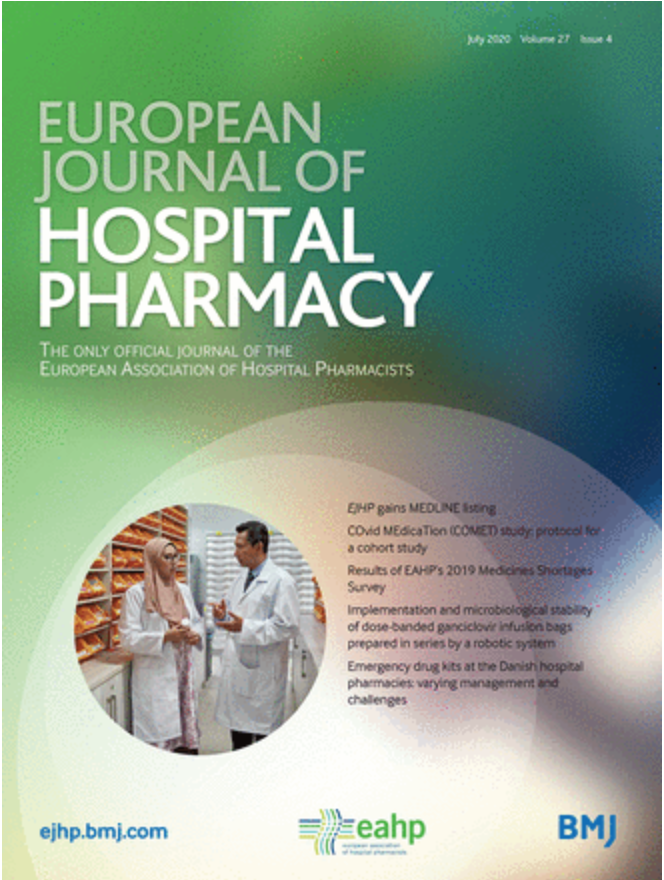
The online first edition of the European Journal of Hospital Pharmacy (EJHP) released an original article which shares insights on the development a process to estimate critical care drug requirements to robustly inform regional procurement planning and preparedness in response to the COVID-19 pandemic.
Read the article HERE
 [COVID-19 Updates]
[COVID-19 Updates]
EAHP’s COVID-19 Resource Centre
To assist its member associations and individual hospital pharmacists in this critical time with the provision of the best possible care for patients, EAHP has decided to gather and make available information on COVID-19 relevant for the hospital pharmacy profession.
Access the Resource Centre HERE
Royal College of Paediatrics and Child Health – COVID-19: Guidance for acute settings
This document provides guidance for paediatric emergency and acute settings, including preparations, good practice tips, infection control, management of suspected cases in ED and as inpatients, plus advice and guidance on critical care scenarios.
Learn more HERE
United Kingdom: Government of Wales – Rehabilitation needs of people affected by the impact of COVID-19
This guidance focuses on the rehabilitation needs of people who have been directly and indirectly affected by COVID-19.
Learn more HERE
Learn more about the European Statements!
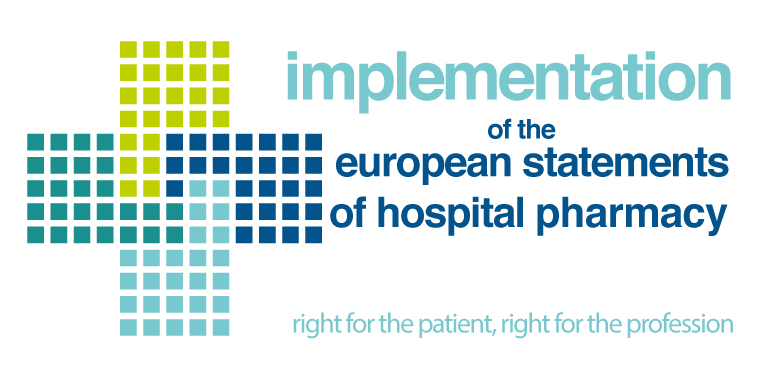
Do you know that the European Statements of Hospital Pharmacy are supported by different stakeholders and are translated into several different European languages? Adopted in 2014, the European Statements express commonly agreed objectives that every European health system should aim for in the delivery of hospital pharmacy services. They were developed by hospital pharmacists with the help of patients, doctors, nurses and others supportive of the hospital pharmacy practice. To foster their uptake and understanding EAHP has not only ensured their translation from English into 22 other European languages but also continued to gather support from healthcare professional and patient organisations. Have a look at EAHP’s Statement website to learn more: https://statements.eahp.eu
___________________________________________________________________________________________________________________
Consultations

EMA – Public consultation on European Medicines Agencies Network Strategy to 2025
The purpose of this public consultation is to seek views from EMA’s and HMA’s stakeholders, partners and the general public on the proposed joint European Medicines Agencies Network Strategy to 2025 and whether it meets stakeholders’ needs.
Deadline – 4th September 2020
Access to the Public Consultation HERE
Commission – Public consultation: Pharmaceuticals – safe and affordable medicines (new EU strategy)
The consultation is looking for input from the public, experts and stakeholders on the following key themes: strategic autonomy and manufacturing of medicines, access to affordable medicines, innovation, and environmental sustainability and health challenges.
Deadline – 15th September 2020
Access the public consultation HERE





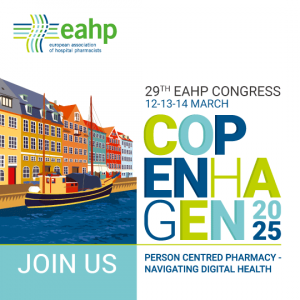
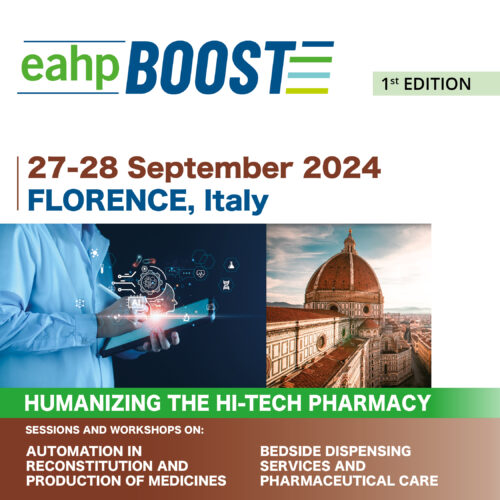






















 [COVID-19 Updates]
[COVID-19 Updates]
